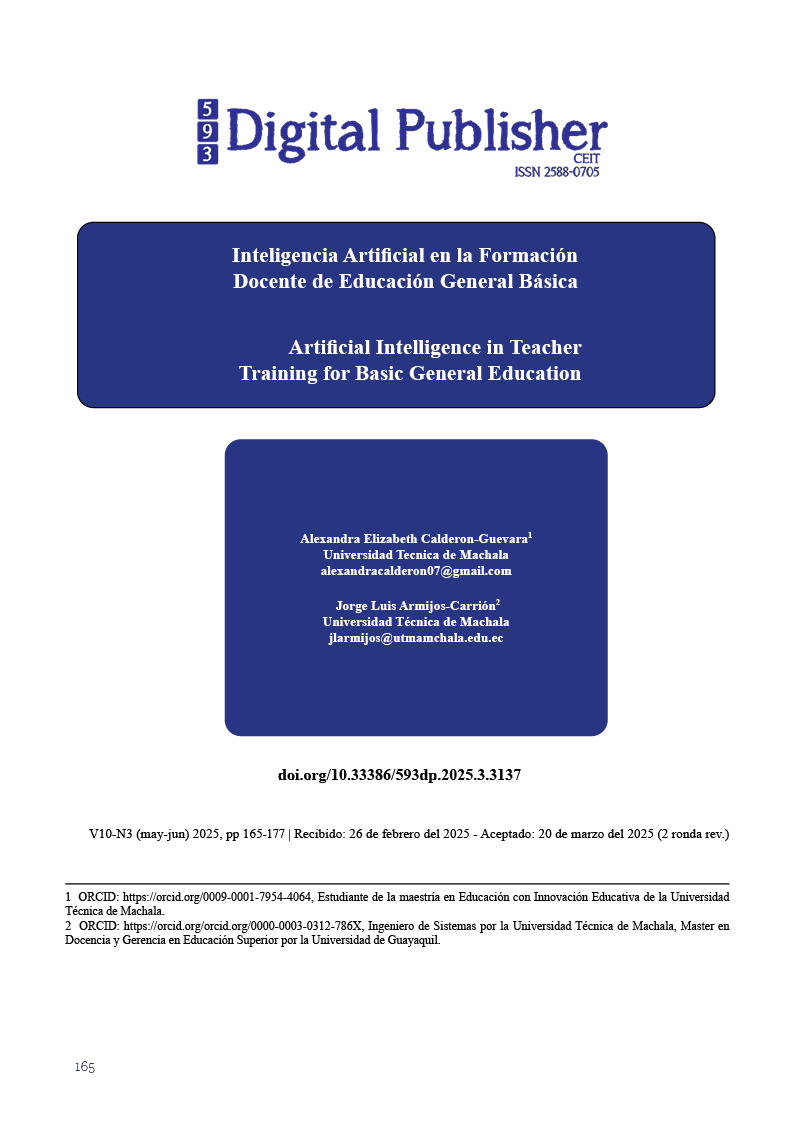Artificial Intelligence in Teacher Training for Basic General Education
Main Article Content
Abstract
Artificial Intelligence (AI) has transformed various sectors, including education. In the context of teacher training in General Basic Education, its integration enhances educational quality, personalizes learning, and optimizes educators' pedagogical competencies. This study analyzes the impact of AI on the teaching-learning process of teachers at the Vicente Rocafuerte School, focusing on the challenges and strategies necessary for the successful implementation of AI in teacher and student training. The research followed a mixed-methods approach, using a closed survey to determine the number of pedagogical and methodological strategies applied in the use of AI. Additionally, interviews were conducted to detail the resources and tasks that teachers develop with their students. The results show that teachers primarily use AI for basic tasks, such as recording attendance and tracking students' academic performance. However, despite their interest, they believe that working with AI requires financial and technological resources, which limits its adoption. In response to this perception, the research proposed a training program presenting accessible and free tools such as ChatGPT and Socratic. By the end of the training, teachers showed greater motivation upon discovering that AI reduces repetitive tasks, allowing them to dedicate more time to professional development. This approach enhances educational quality and improves harmony among teachers. The experimentation with AI tools optimizes pedagogical activities, improves the quality of the educational process, and promotes a more balanced work environment.
Downloads
Article Details

This work is licensed under a Creative Commons Attribution-NonCommercial-ShareAlike 4.0 International License.
1. Derechos de autor
Las obras que se publican en 593 Digital Publisher CEIT están sujetas a los siguientes términos:
1.1. 593 Digital Publisher CEIT, conserva los derechos patrimoniales (copyright) de las obras publicadas, favorece y permite la reutilización de las mismas bajo la licencia Licencia Creative Commons 4.0 de Reconocimiento-NoComercial-CompartirIgual 4.0, por lo cual se pueden copiar, usar, difundir, transmitir y exponer públicamente, siempre que:
1.1.a. Se cite la autoría y fuente original de su publicación (revista, editorial, URL).
1.1.b. No se usen para fines comerciales u onerosos.
1.1.c. Se mencione la existencia y especificaciones de esta licencia de uso.
References
Almirall, E. (2024). Khanmigo (Khan Academy) y el futuro de la educación. ESADE. https://www.esade.edu/es/articulos/khanmigo-khan-academy-y-el-futuro-de-la-educacion
Berrones, L., & Buenaño, P. (2023). ChatGPT en el ámbito educativo. Esprint Investigación, 2 (2), 45-54. https://dialnet.unirioja.es/descarga/articulo/9698315.pdf
Diego, F., Morales, I. & Vidal, M. (2023). Chat GPT: origen, evolución, retos e impactos en la educación. REMS, 37 (2). http://scielo.sld.cu/scielo.php?script=sci_arttext&pid=S0864-16#:~:text=%C2%BFQu%C3%A9%20es%20el%20Chat%20GPT,Transformer%20o%20Transformador%20Preentrenado%20Generativo.
Dúo, P., Moreno, A., López, J., & Marín, J. (2023). Inteligencia Artificial y Machine Learning como recurso educativo desde la perspectiva de docentes en distintas etapas educativas no universitarias. RiiTE Revista interuniversitaria de investigación en Tecnología Educativa, (15), 58–78. https://doi.org/10.6018/riite.579611
El Comercio. (16 de mayo de 2023). La inteligencia artificial creará una forma de trabajar complemente nueva. https://www.elcomercio.com/tecnologia/inteligencia-artificial-creara-forma-trabajar.html
Gómez, M & Saba, M. (2017). Teoría de Siemens - Parte 1. George Siemens: el aprendizaje en red y nuevos entornos educativos. Docentes en línea. En Memoria Académica. https://www.memoria.fahce.unlp.edu.ar/art_revistas/pr.15145/pr.15145.pdf
Guevara Alban, G., Verdesoto Arguello, A., & Castro Molina, N. (2020). Metodologías de investigación educativa (descriptivas, experimentales, participativas, y de investigación-acción). RECIMUNDO, 4(3), 163-173. doi:10.26820/ recimundo/4.(3).julio.2020.163-173
IONOS. (2022). Socratic: el asistente escolar a examen. https://www.ionos.com/es-us/digitalguide/paginas-web/desarrollo-web/socratic-la-app-que-te-ayuda-a-hacer-los-deberes/
Mulumeoderhwa, E. (2024). El conectivismo digital en los procesos de enseñanza y aprendizaje: principios y aportes pedagógicos. RLO Revista Latinoamericana Ogmios, 4 (10), 1-11.
Parra-Taboada, M. E., Trujillo-Arteaga, J. C., Álvarez-Abad, D. R., Arias-Domínguez, A. S., & Santillán-Gordón, E. (2024). El impacto de la inteligencia artificial en la educación. Revista Científica Retos De La Ciencia, 1(4), 169–181. https://doi.org/10.53877/rc.8.19e.202409.14
Perrenoud, P. (2008). La evaluación de los alumnos. De la producción de la excelencia a la regulación de los aprendizajes. Entre dos lógicas. 1era edición. Buenos Aires: Colihue.
Rondón, G. (2023). El Rol docente en el uso de la Inteligencia Artificial en ambientes educativos. Dialógica, Revista Multidisciplinaria. 20(2), 49-70.
Salas, H. & Díaz, J. (2024). Percepciones del personal docente acerca del uso ético de la inteligencia artificial en su labor educativa. Revista Innovaciones Educativas, 26(41), 63-77. https://www.scielo.sa.cr/pdf/rie/v26n41/2215-4132-rie-26-41-63.pdf
Socorro, J. (2024). Actitudes del profesorado ante el uso y manejo de la inteligencia
artificial generativa (IAG) de modo eficiente. Revista Vitalia, 5(3), 1183–1213. https://doi.org/10.61368/r.s.d.h.v5i3.325
Sumardi, L., Rohman, A., & Wahyudiati, D. (2020). Does the Teaching and Learning Process in Primary Schools Correspond to the Characteristics of the 21st Century Learning International Journal of Instruction, 13(3). https://doi.org/10.29333/iji.2020.13325
Tramallino, C., & Marize Zeni, A. (2024), Avances y discusiones sobre el uso de inteligencia artificial (IA) en educación, Educación XXXIII (64), 29-54. https://doi.org/10.18800/educacion.202401.M002



